Kristen Lamb's Blog, page 40
July 11, 2016
Is Being a “Good” Girl Hurting Your Career? Why “Bad” Girls Become Best-Sellers

Today is a repost because of a death in the family last week. But you know what? Life moves on. I chose this post because we all need a good kick in the ass now and again, even ME.
It was a FUN post and a good way to get my moxie back….because seriously my moxie got kicked in the face last week. I am sure NONE of you have been there. Feeling like a failure, like nothing you do matters?
Well, get over it. We are going to have a hell raising Monday!
Last fall I read Kate White’s I Shouldn’t Be Telling You This: Success Secrets Every Gutsy Girl Should Know. There are bad books, okay books, good books and great books. But there is another kind of book and it’s the rarest.
The game-changer.
White has a witty, sassy style. She is seamlessly intelligent and down-to-earth in her fiction. And guess what? Her nonfiction delivers more of the same.
Back to our topic of being too damn nice for our own good.
Good Girls Don’t Become Best-Sellers
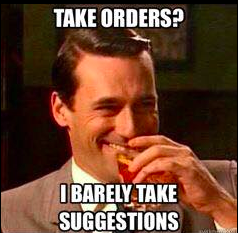
Before you throw digital knives at me, please hear me out. I’ve been doing this social media thing since MySpace was big. I have three books under my belt, well over 1000 blogs, and thousands of hours of teaching. So I’ve been around long enough to at least make a very unscientific study of human behavior and I can tell you that men almost always have the advantage in the new publishing paradigm. They have the edge for the same reasons they gain the advantage in the workplace.
Those lessons our mothers and grandmothers passed on could be the very behaviors that have us standing in our own way. I feel this is particularly true for the writing profession since it is largely comprised of women over 30.
Women over 30 have lived long enough to see this world change more than it ever has in the entire course of human history. Who would have imagined we’d say things like, “I want a picture. Hold on while I get my phone!”
Many of the writers I work with believe they are struggling with branding because of the technology, but I don’t agree. I think women are finally in a position where we must choose. It is live or die. If we listen to our rearing we will lose and lose BIG.
We don’t like the new paradigm because we can’t hide behind an agent and wait meekly for outside approval. The new publishing paradigm lands us smack dab in the place we are most terrified.
What I am going to address can help the men (the “Nice Guys”) but since last I checked I am NOT a guy? Give your thoughts/perspectives in the comments *smooch*
But us older gals? I could kick myself for not seeing this earlier and it figures it would take a former Editor in Chief of Cosmopolitan Magazine to help me see the light. I’m going riff with some of the ideas presented in Ms. White’s book and apply them to women in the world of publishing. We are taught to be Good Girls and is this having a devastating impact on our careers.
Then, since I hate whining and love solutions, we will throw out the rule books and explore what it is to be a “Bad Girl.”
#1 Good Girls Are Modest
It is unbecoming to brag, so we are modest and humble and we are shooting ourselves in the foot.
In the corporate world, men are more likely to own their accomplishments, whereas women tend to minimize their achievements. To paraphrase White:
If a man has four years of college French, he has no problem stating he is fluent. Women, on the other hand, will downplay their abilities. We say we have a “conversational grasp” of the language.
When it comes to writing, the second a man even starts a novel, he has business cards with “Author” as his title and he is securing a website. Women, on the other hand? Let’s pause that thought for a little test.
How many of you are aspiring writers? Raise your hand. No one will see.
Now, use that hand to smack yourself soundly and never call yourself that again.
Writers write. There is no try. There is no aspire. Aspiring is for wimps. It takes guts and blood to be a writer.
No one will take us seriously unless we do it first.
#2 Good Girls Need Permission
I cannot count how many writers (usually female) have written a novel, numerous novels and yet still refer to themselves as “aspiring writers.” They are waiting for permission to even use the title even though they have a blog and have written hundreds of thousands of words.
Men don’t do this. At least not in the same numbers. I can attest to that. I’ve met men whose writing was so bad they should have been banned from downloading Word until they took some grammar classes, but that didn’t stop them from having a marketing plan or hiring a PR person.
They don’t hesitate to secure a domain, build a blog, or hire the best person to design their cover and if they can’t get an agent? They are more likely to self-publish without needing outside approval to do so.
#3 Good Girls Don’t Have Desires
So many of us gals are afraid to want something. Why is it so hard for us to admit we want something? To claim a certain life? Why do we feel such shame and a need to hide who we are and what we desire?
It is okay for a man to want sex a promotion a raise to want to be a New York Times best-selling author, but for us? There is almost something dirty about wanting to write. Wanting to write and get PAID to write. Wanting to write and to…be famous for it.
Oh no! Kristen has gone TOO FAR! And there is only one punishment for lighting the grail-shaped beacon…
Dirty, naughty Zew t!
Spank us all!
If we are wives and mothers? The problem only compounds from there. I have a hard time expressing I want to go to the bathroom alone, how am I supposed to say I want to be published a LEGEND?
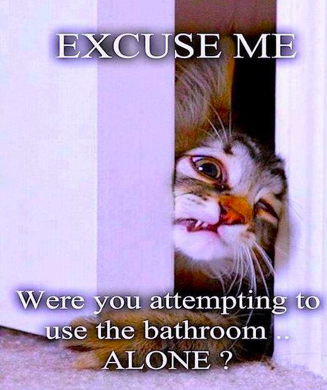
#4 Good Girls Are Demure
Demure=INVISIBLE
As a social media expert for writers, do you know one of the biggest mistakes writers make in branding? They fail to use their names. They tweet as @fairywriter or @ILuvBooks or @dragongirl. They do all of this wonderful networking for months and years and yet it is almost all wasted effort. Why? Because unless I am going to change my name to Fairy Writer and slap that on a cover, that twitter handle is doing zilch nada nothing to build a brand.
Remember what a brand is?
A brand is when our name alone is a bankable asset. It is when a name alone has the power to drive sales.
When I get on social media and see writers using monikers, by and large it is women. Men do this too, but not in the same numbers. And, even if men use a moniker, the second I point out the fallacy, they are far more likely to change it. Women on the other hand are terrified of using their name and take way more convincing.
Men are also far more likely to start a blog. Women?
They have to have three angelic visions, four miraculous encounters and a committee of family members to tell them it would be okay to BLOG. Why is blogging so scary? IT IS FREAKING WRITING. It plays to a writer’s strengths, but I might as well ask writers to perform brain surgery from space with a Chia Pet and an egg beater.
What if people find out I like to write?
Don’t you think they should if you hope they will pay money to read your books?
#5 Good Girls Feel Comfortable Losing
Well, I tried and that’s all that counts.
We women are notorious for placing ourselves in no-win situations. Out of one side of our mouth we say we can’t be on social media because we don’t yet have a book for sale, but when we do have a book for sale? Oh, well I feel so awkward talking to people because they might think I am selling my book.
*bangs head on keyboard*
When a man publishes a book, he is there to win. He isn’t there to see his name in print. He is there to see his name in lights.
But us gals? We are notorious for settling. We feel awkward admitting we maybe kind of sort of would like to be number one. Men have no problem admitting they are on social media because they would like to sell books.
Okay, enough of the “Good Girl” stuff.
I hope I’ve made my point. Now *rubs hands* it is time for me to help you cultivate that inner Bad Girl.
If you want this dream, the first step is to know it is okay to want it. Many of you are moms, wives, and caretakers. Maybe you already have a great career and it is “selfish” to want to write. And I am here to say, YES. It is. And sometimes a little selfishness goes a long way. Men outpace us because they are better at being selfish.
We must learn to stuff a sock in the inner Good Girl’s mouth and channel that inner Bad Girl because she is dying to get out more. Being a Bad Girl doesn’t mean we aren’t still kind and gracious, but it does mean things are going to change.
#1 Bad Girls Do It Afraid
Nothing remarkable happens in the comfort zone. You are going to have to suck it up and writer up. Only sociopaths don’t feel fear. Fear is natural and normal but it gets in the way of greatness. I feel women are far more afraid of failure than men. We wait to be “perfect.” We can’t say anything until we have the perfect book. But perfect is the enemy of the good. Do it afraid.
Yes. You might fail. Odds are you WILL fail and good! Keep failing. It’s how we learn.
My motto?
If we aren’t failing, we aren’t doing anything interesting.
So understand everything I am about to tell you is likely going to scare your pants off.
It’s okay, the erotica authors can lead the way
June 27, 2016
5 Ways to Make a Blogger Want to Stab Us in the Face

Lately, I have been getting a ton of emails from hopeful writers wanting me to write reviews of their books on my blog. Somehow, somewhere I ended up on some marketing guru’s “list” and if I find out who it is, it will not be a good day for that person since they are charging hopeful writers for incorrect information.
Caveat emptor, my kiddos.
I know none of you—beloved followers—are guilty of these mistakes, but I will say that making that shift from unpublished newbie to “pro” is harrowing and we all do some really stupid stuff. It’s part of why I write these posts because none of us has this information embedded in our DNA. We have to learn some time, so maybe this can save you or someone you know some embarrassment.
So five ways to make a blogger want to stab us in the face.
#1—Send a Request Via Form Letter
It’s funny, I blog on certain things and time passes and I think “Whoa! Everyone knows not to do that! I don’t even need to talk about—*brakes screeching*—SERIOUSLY????”
First of all, let me emphasize that requesting a book review is no small thing, which is one of the many, many reasons I almost never do them. In over a thousand blog posts, I have done ONE. Count it. ONE book review on my blog.
Why?
Here are some basic reasons why I almost never, ever do book reviews (other than the fairly obvious reason that I am NOT a book blogger). The blogger has to secure a copy, take time to read the book (12-15 HOURS of undivided attention). Then she has to analyze the book and then craft an intelligent post…for FREE.
We are asking for about a 20 hour time commitment. Again…for FREE.
This means that if you meet a book blogger or reviewer, you should just hug them or make a small large burnt offering of coffee and chocolate. Reviewing books is a really tough and often thankless job.
Meaning, the very least a writer can do when asking for such leviathan effort, is to address the BLOGGER BY HER FREAKING NAME.
When I see this crap in my In Box? It makes me see red.

And lately I’ve been getting far too many of these kinds of e-mails.
#2—Fail to DYH
Do your homework! DYH is actually a two-pronged deal. First of all, any a$$hat with a web site and a shopping cart can claim to be a “guru” with a list of reviewers/book bloggers for sale. I’m not exactly certain how these folks do what they do, but I imagine it involves combing the internet for popular blogs then finding our contact e-mail and selling that list. The problem is that these folks may or may not have done any kind of research.
They are simply looking for popular blogs then charging writers for that list.
The e-mail pictured above? This person apparently got my name off a list he’d paid for. A list of bloggers who review literary fiction.
Yeah.
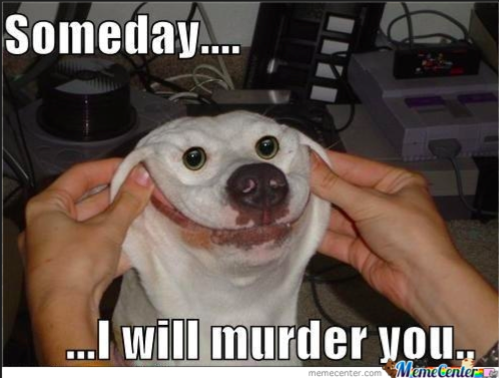
#3—Fail to Make the Match
To reiterate, I am not a book reviewer and even if I were? I would rather be water boarded than read self-published literary fiction. Yes, I am a troglodyte—judge me all you want—because I’d rather be water boarded than read most traditionally published literary fiction.
I know! I am uncouth and horrible and plebeian and I will totally own it. I read all kinds of fiction, but like most literate humans, I have my ranking of favorite genres…literary being dead last and about ten slots below instructions on how to update to Windows 10.
But while you might be horrified to find out that I don’t care for literary fiction, it IS useful information.
If we are looking for someone to review our books, we need to make sure we are finding reviewers who are passionate about the genre.
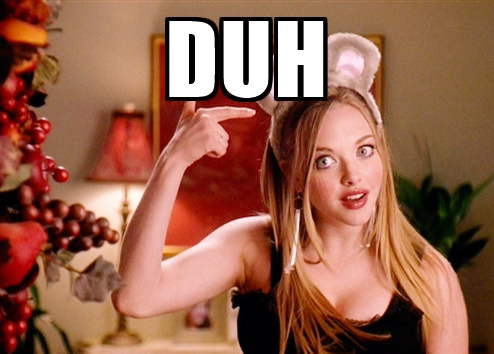
Do not try to get an expert in literary reviews to look at an epic high fantasy. It wastes your time, the reviewer’s time and it’s just a bad plan.
First of all, it highlights we didn’t do the research to see what kind of books the reviewer specializes in. Secondly, the reviewer might not possess the right set of eyes for judging our work. This is like taking our BMW sedan in to a mechanic who works on BMW motorcycles. Sure, he works on BMWs but the skill set is completely different.
If someone who doesn’t like your genre reviews your book, that already stacks odds against the reviewer having an enjoyable experience which bodes ill for your work. Also, if that person hasn’t read a lot of the genre, he will be ill-equipped to give a solid review. All genres have expectations and a good reviewer understands what those are.
#4—Fail to Even Get Eyes on the Blog
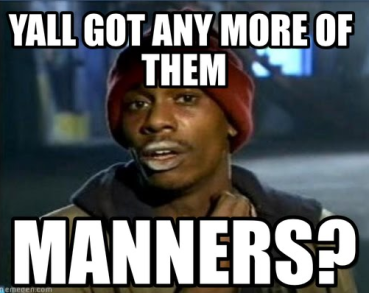
What I’ve found particularly unsettling about this barrage of messages from hopeful writers is that not ONE of them took time to even stop by and look at my blog. All of my archives are available. In fact, google my name with book reviews and not a single book review.
Getting a book review should be approached the same way as looking for an agent or publisher. Do the research. Look at their site. Who are they? What do they do? Double-check everything, especially any paid lists. We need to make sure that the information is even accurate, but more specifically? We need to make sure it is a good fit.
Check the blog to make sure you want that reviewer getting hands on your work. Is the reviewer any good? Is he professional? Is she kind? And I don’t mean kind as in using kid gloves on the work, but we don’t want to just hand our stuff to a reviewer who gets hits from crushing authors’ will to live.
My expertise is in content editing. I have earned the nickname The Death Star and for good reasons. In fact, I’ve been killed in at least five novels that I know of from authors who were grateful for my Red Pen of Doom…but who also wanted the joy of legally murdering me.
NOT book reviewer material.
Not. Just don’t.
#5—Make Zero Effort to Engage Ahead of Time
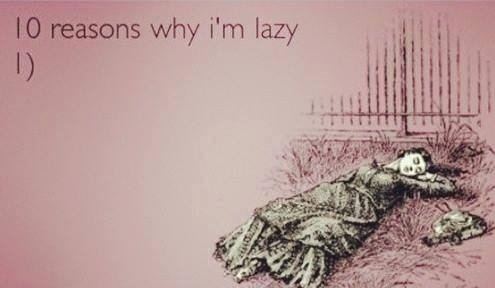
Granted, I don’t do book reviews. I am, however, generous with other stuff. I have had folks who regularly comment on my blogs and after a few months might say something like, “Ugh, I wish I could win your contest. I am just so stuck!” And guess what? I will message and say, “Hey, send me ten pages.” Why?
Reciprocity.
This commenter has taken valuable time to be supportive of me and my blog.
I don’t imagine book bloggers are much different. If we find book bloggers we like, take time to engage, share their posts and form even a loose connection, this can go a LONG way toward making it to the top of their list for a review. Those who “cold call” will rarely be made a priority by any reviewer worth his or her salt.
In the end, manners and kindness go a LONG way. What are your thoughts? For the book bloggers and book reviewers out there, would you have anything else to add?
I LOVE hearing from you!
To prove it and show my love, for the month of JUNE, everyone who leaves a comment I will put your name in a hat. If you comment and link back to my blog on your blog, you get your name in the hat twice. What do you win? The unvarnished truth from yours truly. I will pick a winner once a month and it will be a critique of the first 20 pages of your novel, or your query letter, or your synopsis (5 pages or less).
Check out NEW classes below!
Upcoming Classes
All W.A.N.A. classes are on-line and all you need is an internet connection. Recordings are included in the class price.
Character & Plotting (NEW CLASS!) July 7th
July 6th, 2015 7:00-9:00 P.M. EST. Cost is $35
All great plots are birthed from character. The core plot problem should be the crucible that eventually reveals a hero in Act III. This means that characterization and plot are inextricably linked. Weak plot, weak character. Blasé character, blasé plot.
This class will teach you how to create dimensional characters and then how to plot from inner demons and flaws. Get inside the heads and hearts of your characters in a way that drives and tightens dramatic tension.
This is an excellent class for anyone who wants to learn how to plot faster and to add layers to their characters.
We are doing ANOTHER round of Battle of the First Pages!!! July 15th
The first time we did this we had some tech issues doing this new format and we’ve since worked those out, but for now I am still keeping the price low ($25) until we get this streamlined to my tastes.
LIMITED SEATS. This is an open workshop where each person will submit his or her first page of the manuscript for critique. I will read the page aloud and “gong” where I would have stopped reading and explain why. This is an interactive workshop designed to see what works or what doesn’t. Are you ready to test your page in the fire?
Hooking the Reader—Your First Five Pages July 22nd
The first five pages are the most essential part of the novel, your single most powerful selling tool. It’s how you will hook agents, editors and readers. This class will cover the most common blunders and also teach you how to hook hard and hook early. This class is 90 minutes long, 60 minutes of instruction and 30 minutes for Q&A.
Your First Five Pages Gold Level
This includes the webinar and a detailed critique your first five pages.
Your First Five Pages Platinum Level
This includes the webinar and a detailed critique of your first twenty pages.
Bullies & Baddies—Understanding the Antagonist July 29th
All fiction must have a core antagonist. The antagonist is the reason for the story problem, but the term “antagonist” can be highly confusing. Without a proper grasp of how to use antagonists, the plot can become a wandering nightmare for the author and the reader.
This class will help you understand how to create solid story problems (even those writing literary fiction) and then give you the skills to layer conflict internally and externally.
Bullies & Baddies—Understanding the Antagonist Gold
This is a personal workshop to make sure you have a clear story problem. And, if you don’t? I’ll help you create one and tell the story you want to tell. This is done by phone/virtual classroom and by appointment. Expect to block off at least a couple hours.
For those who need help building a platform and keeping it SIMPLE, pick up a copy of my latest social media/branding book Rise of the Machines—Human Authors in a Digital World on AMAZON, iBooks, or Nook.


June 24, 2016
Are You Botching Your Dialogue?
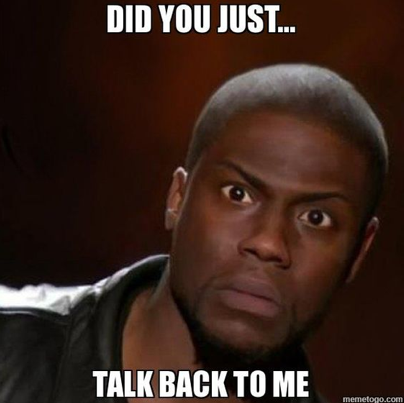
Today we are going to talk about dialogue. Everyone thinks they are great at it, and many would be wrong. Dialogue really is a lot tricker than it might seem.
Great dialogue is one of the most vital components of fiction. Dialogue is responsible for not only conveying the plot, but it also helps us understand the characters and get to know them, love them, hate them, whatever.
Dialogue is powerful for revealing character. This is as true in life as it is on the page. If people didn’t judge us based on how we speak, then business professionals wouldn’t bother with Toastmasters, speaking coaches or vocabulary builders.
I’d imagine few people who’d hire a brain surgeon who spoke like a rap musician and conversely, it would be tough to enjoy rap music made by an artist who spoke like the curator of an art museum.
Our word choices are reflective of WHO we are. Dialogue can not only show age and gender. It can elucidate level of education, profession, personality, ego, wounds, insecurity, and on and on and on.

In fact dialogue is so powerful that one way we know we have done our job as a writer is when we can remove all dialogue tags and the reader still knows which character is talking. This said, there are a LOT of newbie errors I see when it comes to writing dialogue and that’s what we are going to talk about today.
#1 Please Punctuate Properly
When it comes to dialogue, we need to make sure we are punctuating properly. This might seem like a picky matter, but improper dialogue punctuation is a quick way to end up in a slush pile. If a writer doesn’t yet know how to punctuate dialogue correctly, then most agents (or even readers) simply aren’t going to commit any more time.
Also, if you are paying good money for an editor, they have a hard time getting to the MEAT of your story if they are spending all their time fixing disastrous punctuation.
When I get samples from new writers, I see a lot of this:
“Have a nice day” she closed the door and that was when Kristen had to spend the next few hours repairing punctuation.
“Have a nice day.” She closed the door blah blah blah….
OR
“Have a nice day,” she said. She closed the door blah blah blah…
The comma goes INSIDE the end quote mark and then we add a tag. If there is NO tag word (said, asked) then we insert a PERIOD.
DO NOT use actions as tags. Why? Because actions are actions…not tags.
“Have a nice day,” she closed the door said.
For all the neat ways dialogue is punctuated, refer to a handy dandy grammar book.
#2 No Weird Dialogue Tags
This goes with the “no action tags” idea.
“I have no idea what you mean,” Kinsey snarled.
“You know exactly what I mean,” Jake laughed.
NO.
Characters can say things or ask things but they can’t smirk, snarl or laugh things. Again, when agents, editors, or even savvy readers see these strange tags, it is a red flag the author is green.
#3 Stick to Unassuming Tags
When using tags, keep it simple— said, asked, replied (maybe). Why? Well, I hate proffering rules without explanation so here goes.
Simply? When we add those creative tags on the end, we are coaching the reader. Our dialogue should be strong enough alone to convey the tone we want. When we coach the reader, we are being redundant and more than a tad insulting to the reader.
“You have some nerve showing your face,” she spat.
See what I mean? By adding the “she spat” I am essentially telling you that I worry you aren’t sharp enough to know this character is upset.
But, I am betting the dialogue alone—“You have some nerve showing your face”—was plenty for you guys to give the appropriate tone of voice in your head. I really didn’t need to add the “she spat.”
I know that keeping to simple tags seems harsh, but if we have done our job writing dialogue, the tags will disappear in the reader’s mind. The dialogue will simply flow.
Additionally, if we write using Deep POV, we don’t even need/use tags.
“I have no idea what you mean.” Kinsey refused to look at him and polished the wine glass so hard she wondered if she’d bore a hole clean through.
See how the character is DOING something that tells us the tone of the dialogue. Remember that communication is about 90% is nonverbal. Body language is a big deal.
Notice we are showing and not telling. Instead of spelling out that Kinsey is irritated, we have her DOING something that shows us she is ticked and trust the reader to fill in the blanks. This also keeps “said” from getting annoying. We shouldn’t need to tag every sentence if the writing is strong.
#4 Do NOT Phonetically Spell Out Accents
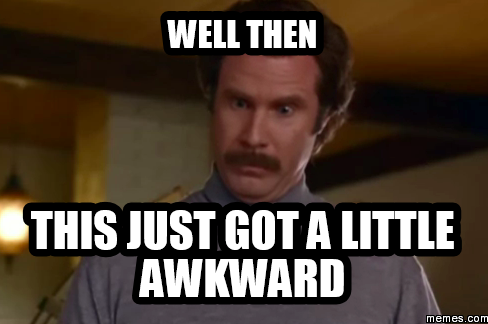
Yes, when we dust off old volumes of literature we see that the writers (I.e. Twain) wrote out dialogue phonetically to show the accent of the character speaking.
BUT…Herman Melville also spent over a hundred pages talking about whales for the same reasons. Most people lived and died in isolation. Travel was reserved for the very rich. Photographs and paintings were rare. There was no television, radio or Internet.
Just like Melville’s readers could live an entire lifetime without seeing the ocean (let alone a whale), Twain’s audience in Europe likely would never travel to the rural American South. Thus, they would have no concept of what a Southern accent “sounded” like. Therefore, in fiction, it was perfectly acceptable to phonetically write out how someone would have talked.
These days, if we are writing a character who has an Irish brogue or a Southern drawl or a Cockney accent, we no longer need to spell it all out phonetically. The reason is that there has been so much entertainment (movies, etc.) that we know what an Irish brogue should sound like and when we “spell it out” for the reader, it makes the dialogue cumbersome.
Spelling out every single word phonetically will wear out the reader. This dovetails nicely into my next point…
#5 DO Feel Free to Use Unique Words, Expressions or Idioms
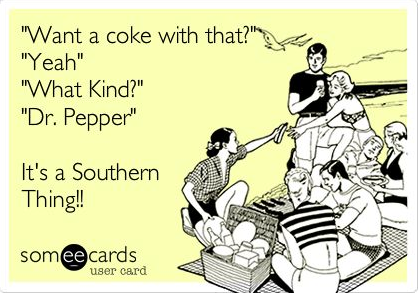
I write a lot of characters who are Texans. It’s true I don’t need to write out the Texas accent phonetically, but I can add in some terms and expressions to keep the reader “hearing” a Texan in her head without making my dialogue weird.
“Y’all won’t believe this. Delroy got a job. A J-O-B.”
“Who’d hire him? He’s useless as ice trays in hell. ”
Feel free to use a couple of words that convey an accent—ain’t, gonna, bloody—just avoid spelling it out in entirety or risk frustrating readers.
#6 DO NOT Have Characters Constantly Calling Each Other By NAME
I see this one a lot and it is seriously weird.
“Biff, what are you doing?” Blane asked.
“Why Blane, I am making a present for Buffy. You know how Buffy is about her birthday. What are you doing Blane? Are you having lunch with Beverly?”
Okay, so I am being a bit silly here to make a point, but how often do you call the other person by name when talking? Who does this? Worse still, who does this over and over and over, especially when there is only one other person in the room? Try this in real life.
Me: Shawn, why are you home so early? I thought you’d be at work.
Hubby: I had to run an errand, Kristen.
Me: Well, Shawn I have to run to the grocery store.
Hubby: Kristen, that is…
Okay, I am giggling too much. Y’all get the gist.
#7 Do NOT Write Dialogue in Complete Sentences
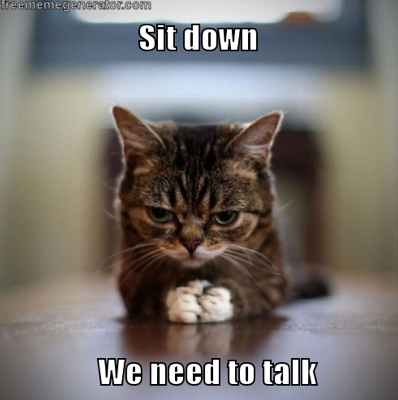
My above examples are kind of a twofer. Not only is the dialogue seriously strange with everyone using a proper name, but notice all the dialogue is in complete sentences. Most people don’t talk that way. If we do, we sound like a robot or a foreigner with a rudimentary grasp of the language.
Is it wrong to have dialogue in complete sentences? No. But usually it is ONE character who talks that way and it is an idiosyncratic trait particular to THAT character. Ie. Data from Star Trek or Sheldon from Big Bang Theory.
#8 Avoid Punctuation Props
Avoid overusing exclamation points and ellipses. Again, if our dialogue is strong enough, readers will “get” when a character is yelling or pausing. Especially avoid being redundant with the punctuation and the tags.
“Get out of my house!” she yelled.
Really? No kidding.
And remember…that…when we use…a lot….of ellipses…we are being annoying….not…….dramatic.
(And ellipses are only THREE dots and in some cases four
June 22, 2016
Symbolism & Setting—The Perfect Marriage
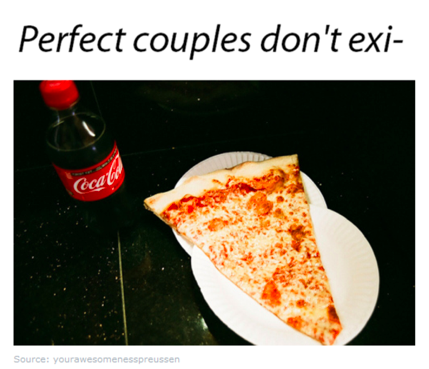
Today I have two very special guests. Angela Ackerman and Becca Puglisi are here to talk about a more advanced concept in fiction—symbol. Take it way, ladies!
***
We all want our writing to be layered. Like a gourmet meal, we want there to be more to them than just what is seen on the surface. In stories, this depth can be added a number of ways—through subplots, character arc, subtext, theme, and symbolism. Of them all, I think symbolism is one of the simplest methods to employ, and it packs a serious wallop.
Symbolism is important because it turns an ordinary object, place, color, person, etc. into something that goes beyond the literal. Babies represent innocence and unlimited potential, spring is synonymous with rebirth, shackles symbolize slavery, the color white brings to mind purity.
Symbols like these are universal in nature because they mean the same thing to many people. As such, universal symbols are helpful in representing what you’re trying to get across in your story; readers see them and understand what they literally and figuratively mean.
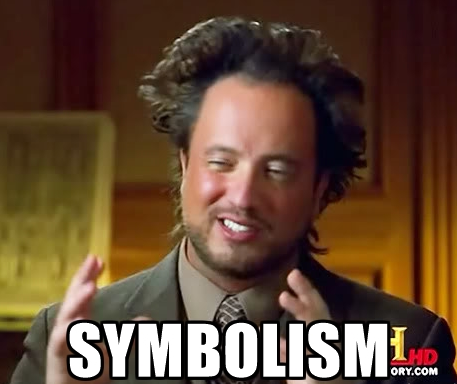
But a symbol can also be personal in nature, more individual, meaning something specifically to the character. For William Wallace in the movie Braveheart, the thistle represents love since one was given to him by Murron when they were children. To most people, love in the form of a prickly weed wouldn’t typically compute, but as it’s used throughout the film at poignant moments, the audience comes to recognize it for what it means.
So whether the symbol is universally obvious or one that’s specific to the protagonist, it can add a layer of depth to a character or story. But where do we find these symbols? How do we choose which object or thing should represent the important theme in a story? Well, it may not be the first answer that comes to mind, but…
The setting is actually the perfect place to find symbols—because they’re built into every location.
Sometimes, the setting itself can stand for something. Kristen touched on this in her excellent post last week, where she used Shutter Island as an example. The prison is a prison, yes, but it also represents the guilt that keeps US Marshall Teddy Daniels locked away inside his own mind.
Other setting symbols?
A home could stand for safety. A river might represent a forbidden boundary. A church could symbolize either hope or corruption, depending on the prevailing culture or the character’s experience. A city, a business, a natural landmark—whether you’ve chosen a rural or urban setting for your scene, the location can often represent an important idea that you want to reinforce for readers.
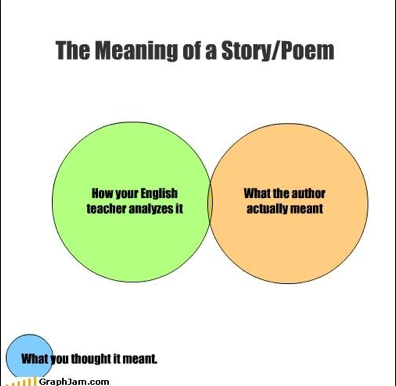
Sorry, couldn’t resist….
But more often than not, your symbol will be something within the setting that represents an important idea to your character. And when you look within your protagonist’s immediate world, you’re sure to find something that holds emotional value for him or her.
For instance, if your character was physically abused as a child, it might make sense for the father to be a symbol of that abuse since he was the one who perpetrated it. But the father might live in another town or thousands of miles away. The character may have little to no contact with him, which doesn’t leave many chances to symbolize.
Choosing something closer to home within the protagonist’s own setting will have greater impact and offer more opportunities for conflict and tension. A better symbol might be the smell of his father’s cologne—the same kind his roommate puts on when he’s prepping for a date, the scent of which soaks into the carpet and furniture and lingers for days.
Another choice might be an object from his setting that represents the one he was beaten with: wire hangers in the closet, a heavy dictionary on the library shelf, or the tennis racquet in his daughter’s room that she recently acquired and is using for lessons. These objects won’t be exact replicas of the ones from his past, but they’re close enough to trigger unease, bad memories, or even emotional trauma.
Symbols like these have potential because not only do they clearly remind the protagonist of a painful past event, they’re in his immediate environment, where he’s forced to encounter them frequently.
In the case of the tennis racquet, an extra layer of complexity is added because the object is connected to someone he dearly loves—someone he wants to keep completely separate from any thoughts of his abuse.
As you can see, whatever settings you choose for your story can be mined for emotionally charged symbols and motifs. Sometimes it can be tough to figure out which one to go with, though; the good news is that symbols can be added at any point in the writing process.
If you know beforehand what your theme will be, consider choosing settings that could reinforce that idea. If your theme emerges organically as you write, you can bolster it by adding motifs later with objects that naturally inhabit the locations you’ve chosen. Either way, if you need a little help coming up with symbols for your story, you can always check out the “Symbolism and Motifs Thesaurus” at One Stop for Writers, which explores a boatload of popular themes and possible symbols that can be used for them.
The setting is such a versatile tool that most of us frankly underuse. Make it pull its own weight by unearthing the symbols within it. And for more information on making your setting work harder for your story, see our latest books, The Urban Setting Thesaurus: A Writer’s Guide to City Spaces and The Rural Setting Thesaurus: A Writer’s Guide to Personal and Natural Spaces.
BIO:
Becca Puglisi is an international speaker, writing coach, and bestselling author of The Emotion Thesaurus and its sequels. Her books are available in five languages, are sourced by US universities, and are used by novelists, screenwriters, editors, and psychologists around the world. She is passionate about learning and sharing her knowledge with others through her Writers Helping Writers blog and via One Stop For Writers—a powerhouse online library created to help writers elevate their storytelling. You can find Becca online at both of these spots, as well as on Facebook and Twitter.

***
Thank you Angela and Becca! remember that comment love for guests counts double for my ongoing contest.
I love hearing from you!
To prove it and show my love, for the month of JUNE, everyone who leaves a comment I will put your name in a hat. If you comment and link back to my blog on your blog, you get your name in the hat twice. What do you win? The unvarnished truth from yours truly. I will pick a winner once a month and it will be a critique of the first 20 pages of your novel, or your query letter, or your synopsis (5 pages or less).
Check out NEW classes below!
Upcoming Classes
All W.A.N.A. classes are on-line and all you need is an internet connection. Recordings are included in the class price.
So You Want to Write a Novel THIS FRIDAY!!!!!
June 24th, 7-9 EST. Cost is $35
Just because we made As in high school or college English does not instantly qualify us to be great novelists. Writing a work that can span anywhere from 60,000 to 120,000+ words requires training. This class is for the person who is either considering writing a novel or who has written a novel(s) and is struggling.
We will cover the essentials of genre, plot, character, dialogue and prose. This class will provide you with the tools necessary to write lean and clean and keep revisions to a minimum.
Character & Plotting (NEW CLASS!)
July 6th, 2015 7:00-9:00 P.M. EST. Cost is $35
All great plots are birthed from character. The core plot problem should be the crucible that eventually reveals a hero in Act III. This means that characterization and plot are inextricably linked. Weak plot, weak character. Blasé character, blasé plot.
This class will teach you how to create dimensional characters and then how to plot from inner demons and flaws. Get inside the heads and hearts of your characters in a way that drives and tightens dramatic tension.
This is an excellent class for anyone who wants to learn how to plot faster and to add layers to their characters.
For those who need help building a platform and keeping it SIMPLE, pick up a copy of my latest social media/branding book Rise of the Machines—Human Authors in a Digital World on AMAZON, iBooks, or Nook.


June 17, 2016
Setting—Why a Picture is Worth a Thousand Words

Hmmmm. Must be Walmart.
Today we are going to talk about setting and ways to use it to strengthen your writing and maybe even add in some dimension. Setting is more than a weather report. It can be a magnificent tool to deepen characters.
Setting Can Help Your Characterization
Setting can actually serve a dual role in that it can be not only the backdrop for your story, but it can also serve characterization through symbol.
We editors love to say, “Show. Don’t tell.” Okey dokey, here’s where setting can help you do just that.
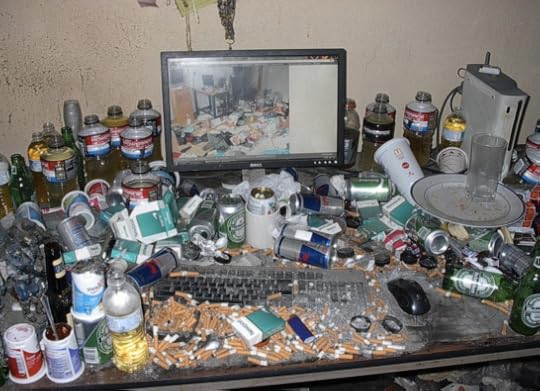
THAT’S a desk with a story. “The menthol brings out the blueberry notes in the Yoplait…”
Say you have a character, Buffy, who is depressed. You could go on and on telling us she is blue and how she cannot believe her husband left her for the Scentsy lady, OR you can show us through setting.
Buffy’s once beautiful garden is overgrown with weeds and piles of unopened mail are tossed carelessly on the floor. Her house smells of almost-empty tubs of chocolate ice cream left to sour. Piles of dirty clothes litter the rooms, and her cat is eating out of the bag of Meow Mix tipped on its side.
Now you have shown us that Buffy is not herself. We know this because the garden was “once beautiful.” This cues me (the reader) that something has changed. And you managed to tell me she was depressed without dragging me through narrative in Buffy’s head.
She couldn’t believe Biff was gone. Grief surged over her like a surging tidal surge that surged.
Writing is therapeutic, not therapy. Some of that introspection is great, but after a while you will wear out your readers. Setting can help alleviate this problem and keep the momentum of your story moving forward. We will get that Buffy is depressed by getting this glimpse of her house. You have shown that Buffy is having a rough time instead of being lazy and telling us.
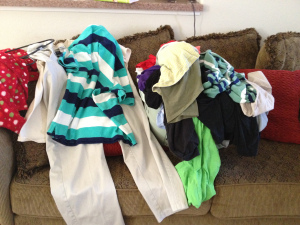
Buffy needs to get a grip.
We judge people by their environment. Characters are no different.
If you want to portray a cold, unfeeling schmuck, then when we go to his apartment it might be minimalist design. No color. No plants or signs of life. Someone who is scatter-brained? Their house is full of half-finished projects. An egomaniac? Walls of plaques and pictures of this character posing with important people. Trophies, awards, and heads of dead animals. You can show the reader a lot about your character just by showing us surroundings.
Trust me, if a character gets out of her car and five empty Diet Coke bottles fall out from under her feet into her yard that is littered with toys, we will have an impression.
Probably the single largest mistake I see in the work of new writers is that they spend far too much time in the sequel.
What is the Sequel?
Plots can be broken into to main anatomical parts–scene and sequel. The scene is where the action occurs. A goal is declared and some disastrous setback occurs that leaves our protagonist worse off than when he began. Generally, right after this disaster there is what is called the sequel.
The sequel is the emotional thread that ties all this action together.
Yet, too often new writers will go on and on and on in a character’s head, exploring and probing deep emotions and nothing has yet happened. The sequel can only be an effect/direct result of a scene. Ah, but here comes the pickle. How can a writer give us a psychological picture of the character if he cannot employ the sequel?
Setting.
An example? In Silence of the Lambs how are we introduced to Hannibal Lecter? There is of course the dialogue that tells Agent Starling that Dr. Lecter is different, but talk is cheap, right? Clarice goes down into the bowels of a psychiatric prison to the basement (um, symbol?). She walks past cell after cell of the baddest and the maddest. All of them are in brick cells with bars…until Clarice makes it to the end.

Hannibal’s cell is not like the others. He is behind Plexi-Glass with airholes. This glass cage evokes a primal fear. Hannibal affects us less like a prisoner and more like a venomous spider. Setting has shown us that Hannibal the Cannibal is a different breed of evil. This is far more powerful than the storyteller poring on and on and on about Hannibal’s “evil.”
Setting Can Set or Amplify Mood
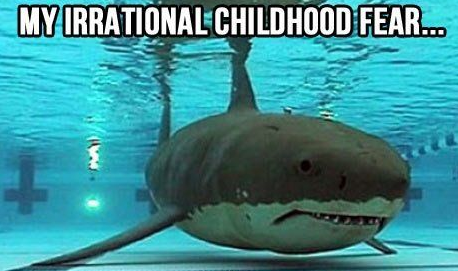
Either you can use setting to mirror outwardly what is happening with a character, or you can use it as a stark contrast. For instance, I once edited a medieval fantasy. In the beginning the bad guys were burning villagers alive. Originally the writer used a rainy, dreary day, which was fine. Nothing wrong with that.
I, however, suggested she push the envelope and go for something more unsettling. I recommended that she change the setting to sunny and perfect weather. In the heart of the village the ribbons and trappings of the spring festival blew in the gentle breeze, the same breeze that now carried the smell of her family’s burning flesh.
Sometimes it is this odd juxtaposition in setting that can evoke tremendous emotion.
Think about how you felt watching the scene in Terminator 2 where the nuke goes off and obliterates a playground.
This tactic is especially useful in horror. Dead bodies are upsetting. Dead bodies at a church picnic are an entirely new level of disturbing.
Setting is a Matter of Style and Preference
Different writers use setting in different ways and a lot of it goes to your own unique voice. Some writers use a lot of description, which is good in that there are readers who like a lot of description. But there are readers who want you to get to the point, and that’s why they generally like to read works by writers who also like to get to the point. Everyone wins.
Whether you use a lot or a little setting will ultimately be up to you. I would recommend some pointers.
Can your setting symbolize something deeper?

I challenge you to challenge yourself. Don’t just pick stormy weather because it is the first image that pops in your mind. Can you employ setting to add greater dimension to your work? Using setting merely to forecast the weather is lazy writing. Try harder.
In Shutter Island, Dennis Lehane’s story is set on an island at a prison for the criminally insane. What the reader finds out is the prison is far more than the literal setting; it is a representation for a state of mind. The protagonist, U.S. Marshal Teddy Daniels is imprisoned by his own guilt and need for justice.
Like the island, he too is cut off from the outside world emotionally and psychologically. Now an island is more than an island, a prison is more than a prison, bars are more than bars, cliffs are more than cliffs, storms are more than storms, etc. Shutter Island is an amazing book to read, but I recommend studying the movie for use of setting as symbol.
So dig deeper. Can you get more out of your setting than just a backdrop?
Blend setting into your story.
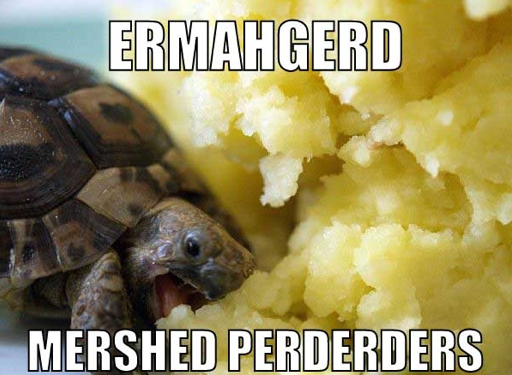
When I teach, I liken setting to garlic in garlic mashed potatoes. Blend. Garlic is awesome and enhances many dishes, but few people want a whole mouthful of it. Make sure you are keeping momentum in your story. Yes, we generally like to be grounded in where we are and the weather and the time of year, but not at the expense of why we picked up your book in the first place…someone has a problem that needs solving.
Unless you are writing a non-fiction travel book, we didn’t buy your book for lovely description of the Rocky Mountains. We bought it to discover if Ella May will ever make it to California to meet her new husband before winter comes and traps her wagon train in a frozen world of death.
Keep perspective and blend. Keep conflict and character center stage and the backdrop in its place…behind the characters. Two fantastic resources to help you with setting are The Urban Setting Thesaurus and The Rural Setting Thesaurus by Angela Ackerman and Becca Puglisi. Do yourself a favor and just buy both of those today.
In the end, setting will be a huge reflection of your style and voice, but I hope this blog has given some insight that might make you see more to your use of setting and help you grow to be a stronger writer. What are some books or movies that really took setting to the next level? How was setting used? How did it affect you?
I love hearing from you!
To prove it and show my love, for the month of JUNE, everyone who leaves a comment I will put your name in a hat. If you comment and link back to my blog on your blog, you get your name in the hat twice. What do you win? The unvarnished truth from yours truly. I will pick a winner once a month and it will be a critique of the first 20 pages of your novel, or your query letter, or your synopsis (5 pages or less).
Check out classes below!
Upcoming Classes
All W.A.N.A. classes are on-line and all you need is an internet connection. Recordings are included in the class price.
Again, I am trying something new and offering an open and interactive workshop. Is your first page strong enough to withstand the fire?
So You Want to Write a Novel TONIGHT!!!!!
June 17th, 7-9 EST. Cost is $35
Just because we made As in high school or college English does not instantly qualify us to be great novelists. Writing a work that can span anywhere from 60,000 to 120,000+ words requires training. This class is for the person who is either considering writing a novel or who has written a novel(s) and is struggling.
We will cover the essentials of genre, plot, character, dialogue and prose. This class will provide you with the tools necessary to write lean and clean and keep revisions to a minimum.
Character & Plotting (NEW CLASS!)
June 24th, 2015 7:00-9:00 P.M. EST. Cost is $35
All great plots are birthed from character. The core plot problem should be the crucible that eventually reveals a hero in Act III. This means that characterization and plot are inextricably linked. Weak plot, weak character. Blasé character, blasé plot.
This class will teach you how to create dimensional characters and then how to plot from inner demons and flaws. Get inside the heads and hearts of your characters in a way that drives and tightens dramatic tension.
This is an excellent class for anyone who wants to learn how to plot faster and to add layers to their characters.
For those who need help building a platform and keeping it SIMPLE, pick up a copy of my latest social media/branding book Rise of the Machines—Human Authors in a Digital World on AMAZON, iBooks, or Nook.


June 15, 2016
Are Flashbacks Fizzling Your Fiction? Time as a Literary Device

One of the most common blunders I see with new authors is they botch the “flashback.” Why? Well, for starters I don’t think subjects/techniques like these get talked about in depth very often (though I could write an entire book on just flashbacks alone). This is part of why I created this Friday’s class, So You Want to Write a Novel. All the lovely stuff English class never taught you
June 13, 2016
Hate the Editing Stage of Writing? Check Out These Helpful Tools
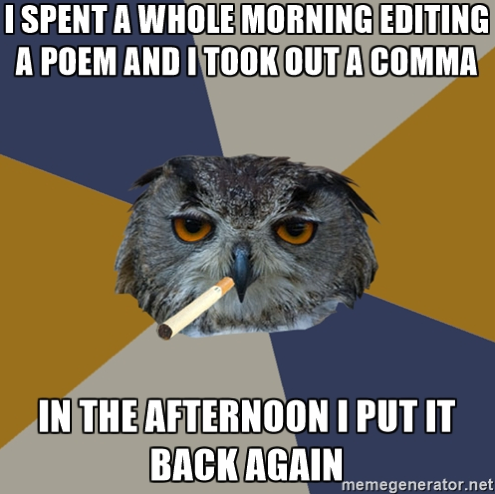
Hey guys, Today Nancy Lin is here to help us with what might just be THE suckiest part of writing. But part of being a great writer, is also learning to be at least a good editor. We all need professional outside eyes on our work, and Nancy is here to help you get the most bang for your buck.
Take it away, Nancy!
***
Editing is a necessary part of writing, but not all writers are great editors. As a writer, I find it helpful to get a second opinion, because I’m not able to see every single error. And this isn’t just me.
You might think you’re the next Shakespeare (which are pretty big shoes to fill). Once you stop basking in your own ego, you can be more realistic about your writing ability. And chances are you’re not.
Professional editors are useful, and, in some cases, they’re necessary. Hiring one may not be as easy as you think. The process can take a great deal of time, and the good ones don’t work for cheap. That’s why you need to learn to do some of the editing yourself.
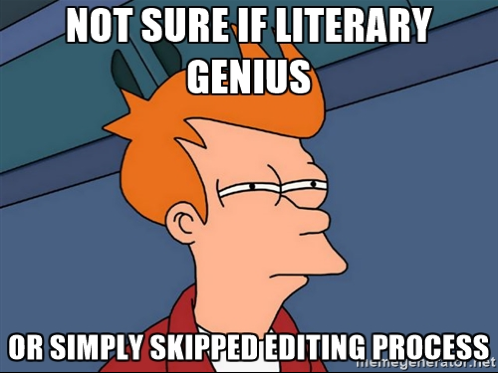
If you learn some self-editing techniques, it could save you time, and it could even save you money. There is also the uncertainty that may come from the waiting process, and not knowing how good (or how bad) your work really is.
Believe me – I’ve been there.
There are some online tools you can use for the editing process, and they come with certain advantages. They can also be cheaper than professional editors. Some of them are even free.
It can be hard to receive criticism from a person, which is why writers cringe at the idea of hiring an editor. After the process is over, they’re sometimes left with a broken bank and a bruised ego. If you get it from a program, it might soften the blow.
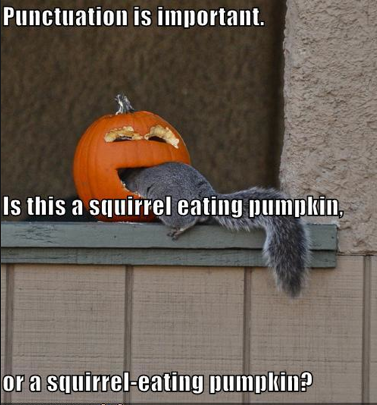
There is another advantage to using these tools, and it’s rather obvious. You can get a better analysis than from a standard spelling and grammar checker, so you will be able to analyze your writing more effectively. This can allow you to be more critical of your own work.
There is one thing you have to remember. Like the rest of us so-called masters of the manuscript, these tools are far from perfect, and they’re not programmed to think. They will be able to identify potential problems with your writing, but you have to decide if you want to follow their suggestions.
As you’re editing, it’s important to remember the “big picture.” Think about what you’re trying to say, and be strategic about any changes you make.
I’m sure you’re dying to find out which editing tools I’ve chosen. So, here they are.

#1: Edit Minion
The best part about this tool is that it’s free. It may not be the best editing tool, but it will get the job done. It analyzes your writing, and it highlights words and phrases that may need correction. They’re even color coded based on the type of error. Just hover your mouse over it to find out why.
Edit Minion will analyze your writing for any of these potential problems:
Adverbs
Weak words
Homonyms
Prepositions at the end of a sentence
Passive voice
Clichés
You do, of course, have to make your own call about what you want to change.
#2: Hemingway App
This tool is also free, and it does real-time reporting as you type. It highlights sentences that may need shortening, and it points out adverbs or sentences in the passive voice. The program is easy to use, and it’s readable. By the way, there is a readability scale, and you get readability grades for your writing. In fact, it’s good for finding sentences that need simplification.
#3: AutoCrit
Unlike the last two, this one isn’t free. You have to have an account, and there is a subscription fee. But you can request a free trial.
It does a detailed analysis of your writing, and it has a “visual guide.” It will even compare your writing to other published works. What is more, it helps you with the standard edits and checks your document for repetitive words and phrases. It will even check for words that are taking too much space.
#4: WordRake
This is another paid tool, working with Word. It analyzes your writing for any redundant words, and it will suggest possible replacements. While it is not the cheapest, it can help you to shorten your sentences and tighten your writing.
#5: SlickWrite
When it comes to this tool, “slick” is the operative word. Not only is it free, but it’s also fast and easy to use. It looks for the common problems (such as adverbs, passive voice and awkward phrasing)) that can plague your writing. SlickWrite has an intuitive interface, and you can move between the five tabs located at the top.
#6: SmartEdit
SmartEdit is another tool that works with Word, but you can use it as a standalone app. It’s only available for Windows, but there may be a Mac version later on. It does 20 different checks on your writing – some which include:
Misspellings
Misused words
Repeated phrases
Adverbs
It will also check for clichés, redundancies, and dialogue tags.
#7: ProWritingAid
This tool works with a variety of writing platforms and web browsers like the following ones:
MS Word
Google Docs
Scrivener
Google Chrome
It has both a free and premium version. There are actually two premium levels. The free version will let you analyze up to 3,000 words at one time, but there is no interactive editing. The first premium level has everything in the free version, but it doesn’t have a word limit. A great bonus: The Premium+ version has a plagiarism checker.
#8: Consistency Checker
While it doesn’t do the detailed checks of the before mentioned tools, it can be useful in the editing process. In fact, it does as the name suggests. Just upload the document, download the report, and it will point out any inconsistencies.
#9: Unplag
Unplag is not an editing tool per se, but it can be helpful in the process. It’s an online plagiarism checker, which detects text coincidences in your work. It can check a few documents at once, and there is a full report showing highlighted text similarities, originality percentage, links to the original sources and other important details. The small investment can keep you from destroying your reputation and your career.
#10: After the Deadline
This tool installed in your browser checks your writing for spelling errors, misused words, and other common issues. When you write an email or new Facebook post, After the Deadline will notice any typos or mistakes immediately. The built-in AI recommends alternatives that can improve the flow of your writing, and it has a list of 1,500 words that are often misused.
Final Thoughts
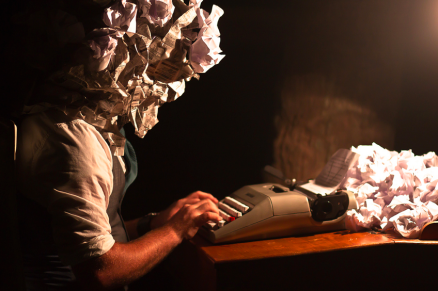
Image via Drew Coffman courtesy of Flickr Creative Commons
Editing can be a long process, but it’s a necessary part of writing. It makes your manuscripts cleaner, more concise, and more effective. You might not like editing, but using some of these tools can save you a great deal of time. Not to mention, you can save on editing costs.
Not every writer likes editing. Some of them probably despise it, but there’s no way you can escape it. It’s just part of the job. And you’re going to have to suck it up and get it done.
So, will you take advantage of these tools so you can become a better writer? What other resources you will recommend your fellow writers?
***
Thank you NANCY! And I love hearing from you! Remember comments for my guests get double weight in the contest.
To prove it and show my love, for the month of JUNE, everyone who leaves a comment I will put your name in a hat. If you comment and link back to my blog on your blog, you get your name in the hat twice. What do you win? The unvarnished truth from yours truly. I will pick a winner once a month and it will be a critique of the first 20 pages of your novel, or your query letter, or your synopsis (5 pages or less).
Check out classes below and Battle of the Pages is almost full, so get your seat while you can!
About the Author:
Nancy Lin is a freelance writer, blogger and editor from Kansas City. Her articles have appeared in a number of writing-related websites, including DIYAuthor, Cultured Vultures and Plagiarism Today. If you’re interested in getting help with your writing, you can always find Nancy on Google+ and Twitter.
I love hearing from you!
Upcoming Classes
All W.A.N.A. classes are on-line and all you need is an internet connection. Recordings are included in the class price.
Again, I am trying something new and offering an open and interactive workshop. Is your first page strong enough to withstand the fire?
Battle of the First Pages
June 16th, 7-9 EST. Cost $25
This is an interactive experience similar to a gong show. We will upload the first page and I will “gong” when I would have stopped reading and explain why. We will explore what each writer has done right or even wrong or how the page could be better. This workshop is two hours long and limited seats available so get your spot as soon as you can!
So You Want to Write a Novel
June 17th, 7-9 EST. Cost is $35
Just because we made As in high school or college English does not instantly qualify us to be great novelists. Writing a work that can span anywhere from 60,000 to 120,000+ words requires training. This class is for the person who is either considering writing a novel or who has written a novel(s) and is struggling.
We will cover the essentials of genre, plot, character, dialogue and prose. This class will provide you with the tools necessary to write lean and clean and keep revisions to a minimum.
Character & Plotting (NEW CLASS!)
June 24th, 2015 7:00-9:00 P.M. EST. Cost is $35
All great plots are birthed from character. The core plot problem should be the crucible that eventually reveals a hero in Act III. This means that characterization and plot are inextricably linked. Weak plot, weak character. Blasé character, blasé plot.
This class will teach you how to create dimensional characters and then how to plot from inner demons and flaws. Get inside the heads and hearts of your characters in a way that drives and tightens dramatic tension.
This is an excellent class for anyone who wants to learn how to plot faster and to add layers to their characters.
For those who need help building a platform and keeping it SIMPLE, pick up a copy of my latest social media/branding book Rise of the Machines—Human Authors in a Digital World on AMAZON, iBooks, or Nook.


June 10, 2016
Emotional Toughness—How Haters & Hurt Feelings Can Be GOOD for Us
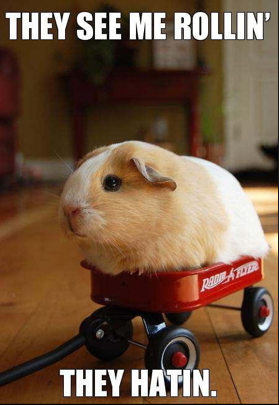
Yesterday I reposted an old blog addressing how I feel PC and EC (Emotional Correctness) has gone more than a little crazy and often has done more to alienate people than to bind them. The thread had some really wonderful and thoughtful commentary. Not everyone wholly agreed on everything but everyone seemed to strive to be thoughtful and kind. THANK YOU, btw.
But some of the commentary about aggression and hurt feelings got me thinking about how we have become as a culture. Are we becoming too sheltered? Is it doing more harm than good?
Bear with me a moment.
I LOVE air conditioning. I live in Texas, so in the summer, I probably love AC more than my husband. I also love Costco, because….
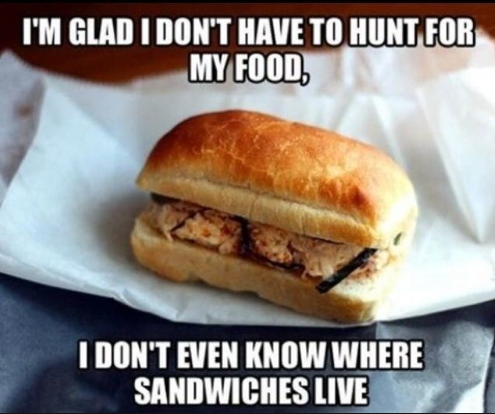
I really like being able to drive everywhere instead of walking or saddling up a horse. Indoor plumbing? Huge fan. But often I wonder how soft these conveniences have made me (since I think about a possible zombie apocalypse more than is probably healthy).
If life as I knew it imploded tomorrow, how would I fare? With no power, no Internet, no running water? With no AC and it is 110 degrees and 90% humidity? Since I don’t have to swing an ax daily for fuel if I want to eat? I have writer hands. How will those fare?
Not well.
The hard truth is we don’t grow without being uncomfortable. We don’t get tough without friction. And I wonder if this being comfortable has permeated too much of our lives, down to our “feelings.” I have to say after working well over a decade with other writers, the single biggest hurdle we have to overcome is our feelings.
We must get rhino skin.
Let Me Illustrate
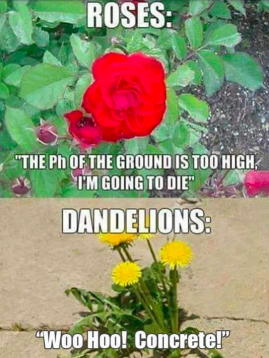
There was once an interesting experiment. In the middle of the desert, scientists constructed a bio-dome. Inside, life would be a “perfect” world where it was always an ambient 76 degrees.
The trees would get all the sun they needed, all the water, all the nutrients. There were no storms, no pests, no diseases, and no overcrowding, and no weeds. Surely, with these perfect conditions the trees would thrive, right?
WRONG.
Eventually the scientists noticed that the trees in the bio-dome grew slower and were smaller than trees in the “real” world. They also never grew above a certain height. They had very shallow root systems. Overall, they looked…unhealthy.
How could this be?
Since they were scientists they did what scientists do. They went back over the data. What had gone wrong? They’d given the trees all they needed to thrive…or had they?
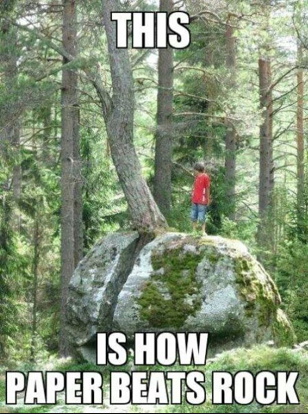
Eventually, they realized that in the hard cruel world, trees weren’t all evenly spaced for enough room, so they had to grow taller to compete for sun. Since water wasn’t delivered daily and there were even periods of drought, the trees were forced to grow deeper roots. Deeper roots could reach the water table. Deeper roots clung on when winds were high.
Speaking of high winds. Storms broke off weaker branches, forced the trees to get tougher bark, to increase the diameter of branches. Pests and diseases? The unprotected trees survived them and became resistant to them. Weeds? They had to learn to successfully compete or coexist.
What does this say about us?
We NEED Push-Back to Grow
I do weight training and sadly, the pink one-pound dumbbells are pretty much useless for anything that doesn’t involve me breaking a pinky toe. In order to get stronger, I need resistance. Resistance causes pain.
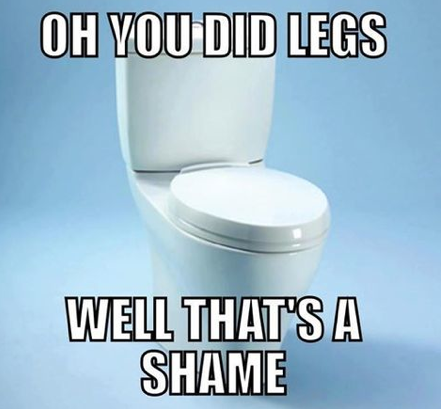
Yesterday was leg day, which means I am likely going to have a pronounced hobble that will pass…just in time for the next leg day. But I do this because it makes me lean and strong and healthy[image error] .
I know that my body must endure resistance to become stronger and faster, but truthfully? So do my feelings.
Now, please understand. I believe we should always be respectful and as a species it is just good for everyone if we are not acting like a bunch of insensitive asshats. Manners are what separates us from animals.
And proper grammar
June 9, 2016
Lighten the HELL UP! Combatting the Plague of Self-Importance

Jester Baby from Scarborough Faire
There is a lot of “stuff” going on in the world and many of us are hiding from our Facebook feeds. This is a scary blog to post (and is actually a repost) but I think maybe people need to hear what I am going to say…again.
LIGHTEN THE HELL UP!
It’s life and none of us are getting out alive.
This blog started when I ran across a post from Yahoo, Is America Starting to Target Thought Crime? In the past two years since I originally posted this, the emotions of our world have hit a boiling point. Remember that violence isn’t the only way to let off steam (though some unimaginative people seem to think it is). The other and preferable?
LAUGH.
Too Dangerous to Laugh
First, a little bit of history. In the days when monarchies were all the rage, there was one very powerful position some might not be aware of…the court jester. Every ruler had at least one jester and the jester was allowed to mock, poke fun and joke about those in power without repercussions.
The role of the jester was to offer honesty and perspective. Monarchs knew that being surrounded by too many Yes Men who feared reprisal was unwise and dangerous. The jester’s job was to ground rulers and keep them from getting too full of themselves.
I’ve been blessed to travel more than most people ever will, and not all my destinations were nice places. One thing every police state has in common is that no one has a sense of humor. Even innocent comments can be twisted into something dangerous because one is in a world where everyone is jockeying for even the slightest wedge of importance, even when it means bending the truth. Those closest can become “whistle-blowers” against crimes imagined or real. Hmmm, sounds familiar.

Charlie Chaplin. Image vie Wikimedia Commons
Public Pool Politics
Sadly, I’ve been at the other end of this. I love to laugh and relish in making others smile. Put me in a room and I’ll have them in stitches in less than five minutes. My teaching style has been compared to “If Robin Williams had taught writing.” When I was a kid I studied every comedic act down to the timing and tone of voice.
In 1999 I traveled with my best friend to live in a Palestinian refugee camp. Since my Arabic was less than stellar, it was tough. Syria, like all places, has its beauty. I loved the food and people and believed I’d made some friends.
One day, my guides took me to enjoy some recreation at the women’s pool where the hijab can be set aside to splash around and let loose. Being the only blonde many of these women had ever seen off a television, I was soon surrounded by eager friendly faces asking questions about my home, wanting to know about Texas and if I had a job.
In my broken Arabic I made jokes and got them to laugh. We parted ways and I was happy as a clam. The next day, my hosts warned me that it was too dangerous to return to the pool and to stay away. Apparently, one of the women had spread through the camp that I was talking smack about Assad Sr. (the ruling dictator of the time).
Errr?
I’d never even mentioned Assad. Yes, I was a naive Westerner but I wasn’t THAT stupid. My last weeks there were pretty scary and I’ve never been so relieved to be on a plane.
One pivotal lesson I took away from this experience is this:
A nation is only as free as its sense of humor.
When innocent remarks, observations or disagreements can be used against us? This is a MAJOR warning we are no longer in a free country. When certain groups are immune from criticism, jest or commentary? Houston, we have a problem.
The PC and EC Divide
I know the original purpose of political correctness was well-intended. I’m sure EC (empathetic correctness) has good intentions as well. But the road to Hell is paved with good intentions. I was a child of the 70s and 80s and often think it was a really golden time to grow up. My best friend from the age of six was an Egyptian Muslim (and we are still friends almost thirty years later).
Our neighborhood gang consisted of Charo (Mexican), Ngyuen (Vietnamese), and Regina (African American), Veenah (Indian), Cathy (Jewish), Elizabeth (Mexican), and Erica (Choctaw)…and none of us were aware of that.
We were friends who karate fought in the yard because Ngyuen was Asian and so he was supposed to be a Kung Fu master, right? Veenah helped with science and Charo taught us soccer, because Indians were smart and Mexicans were good at soccer.
Regina made us laugh because she was black and loud and fun and could Double Dutch so well we were sure she was a cyborg. Erica could decorate our hair with feathers and we could play Navy SEAL Indian Princess. Cathy declined to join us for Vacation Bible School because she was going to Jewish Camp (and we never understood why we couldn’t go to Jewish camp because the Jewish pool was AWESOME).
And all of this is racist and utterly politically incorrect.

Image via Flickr Creative Commons, courtesy of Stephen Depolo.
We never knew we might offend Charo by asking him to teach us to bounce a soccer ball on our knee. We never realized how we might damage Ngyuen by assuming he’d trained in a Shaolin temple and that we didn’t even have the right country.
I didn’t know I should have been ashamed to play Indian Princess with Erica or that I might hurt Regina by offering to share my slice of summer watermelon. I should have been aware that I might harm Veenah by asking for her help with my science project. In high school, perhaps I shouldn’t have asked my best friend and date to the Senior Prom, Donnie (gay), for fashion advice.
I was blissfully uneducated about how offensive I was.
We just loved each other, grew up loving each other and still love each other. Gihan (my Muslim friend) and I are still good friends and have been since 1981 (when Kristen had no Gaydar and was in love with George Michael *sighs*).
I still talk with Charo on FB and meet ever so often for dinner with other members of our gang. Erica invites me to birthday parties for her children. I was Ngyuen’s prom date when I was a junior and we only lost touch when he joined the Marines. I still go by his father’s house when I’m in the area even though his English hasn’t really improved since 1983…but he still loves me. Donnie and I talk long into the night when he isn’t exploring the world.
Land of the Free, Home of the Brave, Loyal, Friendly, Resilient MUTT
We grew up in an America of Mutts. I’m not saying that everything was roses and unicorn kisses, but we were American and America was stronger because we could blend all these cultures and races together. Children had this strange appreciation that we all bled the same color when we fell off the monkey bars. We cared less about the color of your skin and more about the color of your bike. They have BLUE????
We could tell the difference between a joke in love and someone being a racist bigot and Lord help the kid who crossed that line.
We were kids who wanted to roller-skate and who constructed ramps, guns, and swords out of every discarded piece of wood. In the glow of a streetlight everyone was pretty much the same color.
Bullfrogs ran from all of us.
No One’s Laughing Anymore

Image via Frank Selmo WANA Commons
These days, I find myself less prone to joke or make conversation with others of a different ethnicity or culture because, bluntly, it’s exhausting and I always seem to screw it up. I find myself hedging everything I say, backpedaling, and struggling to remember my proper and approved PC vocabulary.
I once was trying to be polite when I referred to someone as Hispanic…only to be razed for the next half hour how this person was from Argentina and NOT Hispanic and I was a jerk for not knowing this. I referred to someone as African American only to get my tail handed to me that this person was from Jamaica and didn’t like that term and it figured a white girl would be so insensitive.
If someone is mixed race? *breaks down weeping*
When others make comments about me being a racist simply because I’m white and I point out that I actually have probably the most diverse group of friends anyone could ask for…well that’s precisely what a racist would say: “I have black friends.” But *stammering* I do have black, I mean African American I mean…oh, hell I give up.
This Affects ALL of U.S.
This isn’t a phenomena exclusive to “white people,” either. I remember my husband coming home from work distraught. He worked in Corporate America at the time. One of his team members was Mexican (as in her parents immigrated from Mexico and happily embraced the American Dream). Well, on Cinco de Mayo a fellow employee (also Mexican) asked her if she was going out to celebrate with “her people.” She gave him a genuinely confused look and said, “Huh? My people? I’m American.”
The next day she was being written up by Human Resources for being culturally insensitive. Her coworker found her offensive and turned her in. My husband was having to write out her defense. A MEXICAN female was in trouble for not being Mexican enough?
How does this make any SENSE?
The real crisis in the country is we are laughing less and less. Everyone is special and fragile and needs to be handled with care. PC was to make us more sensitive and BOY did it work. Our nation has the skin of a grape. Self-importance is taking over like a malignant cancer. We walk on eggshells to avoid “offending” someone. We no longer can make mistakes. We are damned if we do and damned if we don’t.
For anyone reading this who is a “person of color” please try and talk to a “white” person. They probably aren’t a racist, they’re simply terrified they’ll say something stupid. And then being terrified we will say something stupid…we say something stupid.
So if we do say something stupid, just forgive us.
I AM the Reason for Many Blonde Jokes
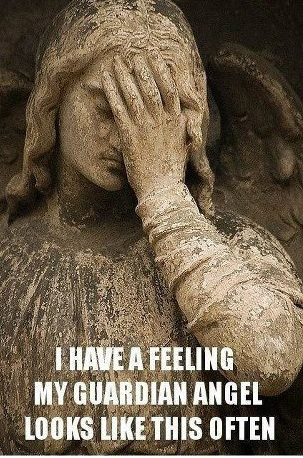
Actual image of Kristen’s Guardian Angel
As much as I read about theoretical physics, math, politics, economics, I can be…well, an idiot. I drove my Honda for three years and all the while heard this weird whistling that I couldn’t get rid of. One night, I’m in a drive thru line and accidentally hit a button near the steering wheel and discovered my car had a sunroof *head desk*.
I once accidentally drove to MISSOURI.
Kill me now and keep me from breeding.
Just leaving all of this to say we need to laugh more. Because, come on, white people…THIS IS FUNNY!
I mean *sniffs* we do love cheese, but insensitive MUCH?
June 6, 2016
Write About Inner Demons Without Boring the Reader into a Coma
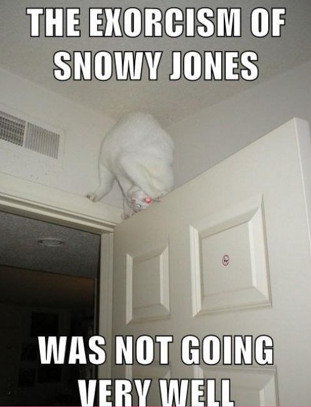
One of the toughest concepts to grasp in writing fiction is this notion of “inner demons.” In all my years working with writers and busting apart countless manuscripts, the single greatest weakness I’ve witnessed with writers is a failure to truly understand how to plot. And before anyone breaks out in hives that I am encouraging detailed outlines, I’m not.
But the problem with inner demons is they are…well…inner. This means that our job as writers is to draw the demons out so they can be destroyed. It’s kind of like The Exorcist, though green puke and spinning heads is all your call.
You might laugh but if you have ever seen any movie involving an exorcism, what is the general progression?
The victim starts acting weird. Not herself. At first it might be written off as depression or lack of sleep or not enough caffeine. Then as the demon gains a toehold, the outward symptoms become more pronounced. Maybe physical changes (growling voice, speaking in Latin). Priests intervene and stuff gets cray-cray but to defeat the demon, what has to happen?
The demon must give its NAME.
You know you watch far too many horror movies when you are no longer scared, but are yelling critique.
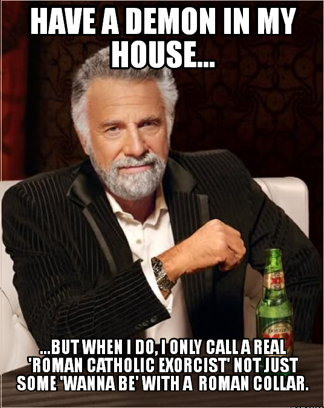
But the point of this I want to make clear is that the one thing these exorcism stories pretty much all have in common is the demon must be NAMED and manifest OUTWARDLY to be defeated.
Same in fiction.
Inner demons are tricky for a number of reasons we will talk about today. The trick is finding the plot problem that will drive the demon to the surface so it can be defeated.
Inner Demons are Inner
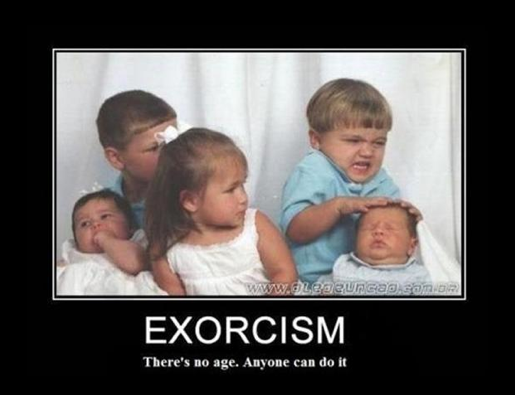
Yeah, I already mentioned that but this is kind of a big deal. Many new writers begin the novel with a character doing a lot of internalization and thinking and thinking and more thinking.
This is problematic for a number of reasons but the biggest is we (readers) just don’t care. We haven’t spent enough time to be vested in a stranger’s emotional baggage.
Do any of us like spending time in person with folks who do nothing but talk about their character flaws and problems? NO. So we are unlikely to want to pay to endure this too much in a book. Can we get there eventually? Sure.
Just like dating. I would hope by the time we dated someone a couple months we might know they haven’t talked to their father in three years and we would care about this problem. In the first fifteen minutes of a first date?
*backs away slowly* *slips barista a $20 to create a distraction to cover ex-fil*
Demons Hide in the Blind Spot
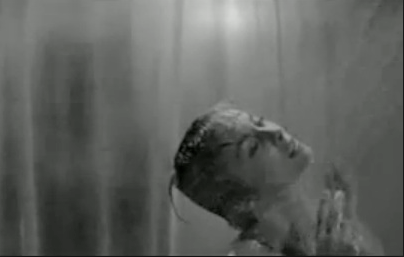
One key thing to remember about demons is they hide really really well. If they didn’t then shrinks would starve and be treated like writers.
Wow, you’re a psychotherapist? Really? What’s your “real” job? Seriously, people PAY you to listen to their problems?
This is another reason we don’t begin with a protagonist thinking about her inner demons. Odds are, she is oblivious they are even there. She isn’t yet that self-actualized.
Denial is more than a river in Africa





